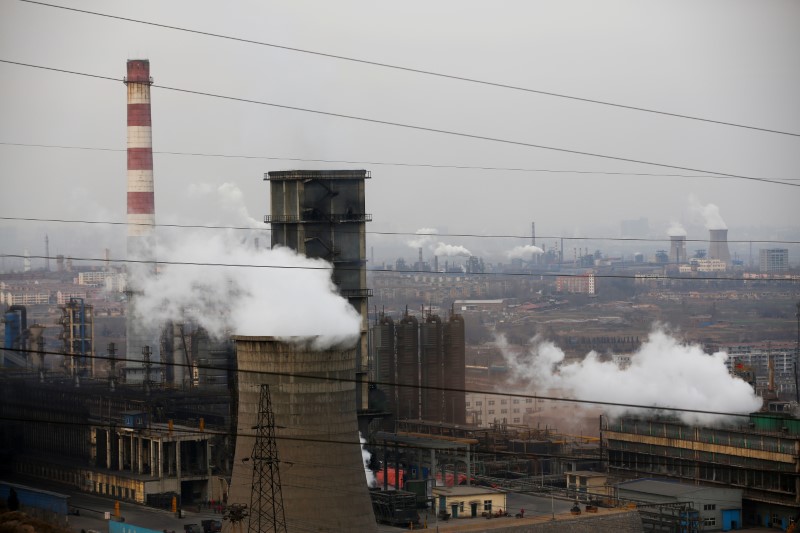 © Reuters. Cooling towers emit steam and chimneys billow in an industrial zone in Wu’an
© Reuters. Cooling towers emit steam and chimneys billow in an industrial zone in Wu’anSHANGHAI (Reuters) – A Chinese program to integrate Beijing’s economy with neighbors Tianjin and Hebei has brought tangible benefits and helped ease damaging income gaps, a government official told Reuters, amid complaints the pace of reform has been too slow.
China announced plans to create the Beijing-Tianjin-Hebei northern super-region, also known as Jing-Jin-Ji, in 2014, as it sought to upgrade the heavy industrial economy of the smog-prone Hebei province while easing congestion, pollution and overdevelopment in the capital.
Firms would be encouraged to relocate from Beijing to Hebei and Tianjin by introducing unified regulations, social services and an integrated transport network. The government also established the new Xiongan economic zone in Hebei last year where some of Beijing’s “non-capital” government functions and industries will be relocated.
But at this year’s full session of parliament, delegates have called for the program to be accelerated, especially when it comes to transportation, with Hebei hoping for improved access to a new international airport under construction in Beijing.
They also said not enough has been done to resolve the innovation gap between Hebei and the capital, which benefits from several high-tech industrial parks.
But the plan has already helped reduce a chronic income gap that forced Hebei to rely on low-end polluting industries while its workers flooded into Beijing in search of better-paid jobs, said Dang Xiaolong, head of Hebei’s economic planning body.
“The central government’s vigorous promotion of integrated development in Beijing-Tianjin-Hebei… has brought immeasurable development potential to our province,” said Dang, who also chairs Hebei’s special office to promote regional integration.
“Because of gaps in development, industrial layout, innovation capability and the endowment of natural resources, the income gap between Beijing and Hebei has existed for a long time – this is a long-term, historical problem,” he said in written comments.
But integration efforts have already helped to raise average annual disposable income in Hebei to 21,484 yuan ($3,401.30) in 2017, up 41.4 percent since 2013, he said. Average income in Beijing, by comparison, stood at 57,230 yuan last year.
“It should be said that through the positive implementation of this national strategy.. the three regions have entered into their best development period in history through aspects such as integrated transportation development, industrial coordination and environmental protection.”
Dang said the focus this year was on the creation of cross-regional transportation networks and the establishment of a unified pollution prevention system.
Hebei will also work to improve communication and coordination with Beijing and Tianjin and sign more cross-regional strategic cooperation agreements, he added.
Fusion Media or anyone involved with Fusion Media will not accept any liability for loss or damage as a result of reliance on the information including data, quotes, charts and buy/sell signals contained within this website. Please be fully informed regarding the risks and costs associated with trading the financial markets, it is one of the riskiest investment forms possible.
Source: Investing.com




























